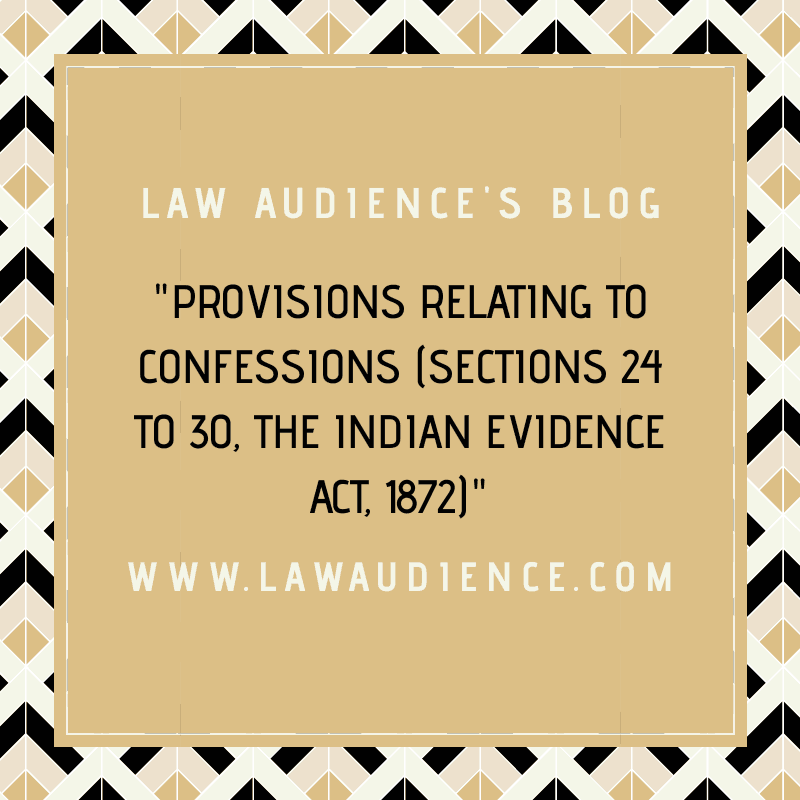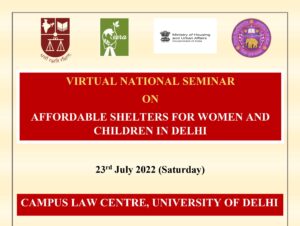AUTHORED BY: MS. NISHITA KAPOOR, B.COM.LL.B, STUDENT AT UNIVERSITY INSTITUTE OF LEGAL STUDIES, PANJAB UNIVERSITY & RESEARCH WRITER AT LAW AUDIENCE.
I. INTRODUCTION:
The term “Confession” has not been defined under the Indian Evidence Act, 1872. The provisions relating to confession are contained under Sections 24 to 30 (Indian Evidence Act, 1872) under the heading “Admission” of the Act thus, confessions are one of the species of Admission. The acid test to distinguish between Admission and Confession is that a statement is a confession when some supplementary evidence is required to authorize conviction.[1]
Sir James Stephen, has defined confession in his Digest of the Law of Evidence as “A confession is an admission made at any time by a person charged with a crime stating or suggesting the inference that he committed the crime.”
In the case of Pakala Narayan Swami v. Emperor[2], Confession was defined as a statement that either admits in terms the offence or at any rates substantially all the facts which constitute the offence.
II. INCULPATORY AND EXCULPATORY STATEMENTS:
The statement made by the accused which suggests that he is guilty of an offence is an Inculpatory Statement but which absolves him of his guilt is an Exculpatory Statement. There existed the well-accepted rule that the Confession must be accepted or rejected as a whole and court is not competent to accept only the Inculpatory part. But now this rule has underwent the change. The following two parts show how the rule has been changed and to what extent.
a) ACCEPTING THE WHOLE OF THE CONFESSION:
In the case of Hanumant v. State of Madhya Pradesh[3], it was held that the confession made by a person cannot be split up and the part of it cannot be used against him. In the case of Emperor v. Balmukand[4] it was observed that where there is no evidence available by which the exculpatory part of the confession is affirmed, the court can only accept or reject it as a whole and not only a part of it.
In the case of Palvinder Kaur v. State of Punjab the findings of the case of Pakala Narayan Swami were upheld on two points:
- The definition of Confession that it is it is a statement that either admits in terms the offence, or at any rates substantially all the facts which constitute the offence.
- That a mixed statement which though it contains some confessional statement, will still lead to acquittal is no confession.
Hence, it also upheld the rule of accepting the confession only as a whole.
b) NOT ACCEPTING THE WHOLE OF THE CONFESSION:
In the case of Nishi Kant Jha v. state of Bihar[5], the Supreme Court accepted a part of the statement of the accused and held there is nothing wrong in accepting only a part and rejecting the rest. But the court did not overrule the above stated judgments as in each case there was no other additional evidence to reject the exculpatory part of the confession. But in this case, the explanations by the accused were inconsistent in themselves also and with other evidence available and hence the court accepted a part of the statement of the accused.
III. IRRELEVANT CONFESSIONS:
1. CONFESSION CAUSED BY INDUCEMENT, THREAT OR PROMISE:
Under Section 24, Indian Evidence Act, 1872, a confession which is caused by inducement, threat or promise flowing from a person in authority, having reference to the charge against the accused person and by which it appears to him that he would gain any advantage or avoid any evil of temporal nature in reference to proceeding against him is irrelevant.
In the case of R v. Middleton[6], where the accused had kept the stolen goods at his friend’s home and police knowing this told him that his friend would be arrested and his children be put to foster treatment. As a result, he confessed his crime and the confession made was not allowed to be put on record.
In the case of R v. Gibbons[7], the confession was made to the surgeon who was attending the accused due to the inducement of some other person who had no authority over the accused. Hence, in this case the confession was held to be free and voluntary.
2. CONFESSION MADE TO POLICE OFFICER:
Under Section 25, the confession made to the police officer is considered as involuntary whether the same has been made even before a person is accused of an offence. The Supreme Court has held that the expression police officer would include any person who is clothed with the powers of a police officer.
The most important power is the investigation powers. Some of the exclusions from the term Police Officer are:
- An officer under the State Reserve Police Force Act who was posted at flag hoisting for maintaining law and order held not to be a police officer under Section 25 (State of Gujarat v. Anirudhsing[8]).
- Custom Officers are not the police officers and hence confession made to them can be proved (Surjeet Singh Chhabra v. Union of India[9]).
- Superintendent of Excise was held not be a police officer (Abdul Rashid v. State of Bihar[10]).
3. CONFESSION BY ACCUSED IN POLICE CUSTODY:
Under Section 26, a confession made by the accused to any person while he is in police custody cannot be proved against him. Police custody need not be in the walls of prison only it can be exercised anywhere whether in the home or an open place. Any place where the person is under the surveillance of police officers is construed as police custody and if he makes any confession, then it is hit by the Section 26. In the case of State (NCT of Delhi) v. Navjot Sandhu[11], the statements made by the accused to the TV and press reporters while they were in police custody were held to be inadmissible.
IV. RELEVANT CONFESSION:
1. WHEN ANY FACT IS DISCOVERED IN CONSEQUENCE OF INFORMATION RECEIVED FROM ACCUSED:
According to Section 27, when due to the statement made by the accused any fact is discovered whether it amounts to a confession or not, is relevant and it can be proved against him. In the case of Mukesh v. State for NCT of Delhi[12], it was held that this section would help in the investigation and also to complete the chain of circumstances.
In the case of State of U.P. v. Deoman Upadhaya[13], Section 27 was held to be constitutional and the contention that Section 161, Criminal Procedure Code and Section 27, Evidence Act are discriminatory was rejected. It held that the classification between a person in custody and person not in custody in relation to the admissibility of statements made by them is reasonable as the object is encourage the people who are not in custody to give the information freely.
2. CONFESSION MADE AFTER REMOVAL OF INDUCEMNET, THREAT OR PROMISE:
Under Section 28 when the accused person makes a confession after the removal of inducement, threat or promise, then that confession is relevant. Once, the mind is free from external influences, any confession made is considered to be made freely and voluntarily and hence can be proved.
3. CONFESSION MADE UNDER THE PROMISE OF SECRECY, UNDER DECEPTION, ETC:
Under Section 29, when the accused makes any confession it is relevant irrespective of the fact that it was made:
- Under the promise of secrecy
- By practicing deception on the accused
- When the accused was drunk
- In answer to the questions which need not have answered.
4. PRESENCE OF MAGISTRATE:
According to Section 26, when confession is made in the police custody in the immediate presence of the Magistrate then it can be proved against him. Otherwise, no confession made in police custody is relevant. The presence of magistrate rules out any form of torture and hence such confession is considered to be made freely.
V. CONCLUSION:
When a confession is made voluntarily and truthfully it is considered highly reliable and has evidentiary value. The proper procedure for recording the confession has been prescribed under Section 164 of the Criminal Procedure Code. It is a mandatory provision and should be followed otherwise the confession made is inadmissible.
[1] Ram Singh v. State , All. L.J. 660 1958
[2] AIR 1939 P.C. 47
[3] AIR 1952 SC 343
[4] I.L.R. (1930) 52 All. 1011
[5] 1959 S.C.R. 1033
[6] (1974) Q.B. 191 C.C.A
[7] (1823) 1 C & P. 97
[8] AIR 1997 SC 2780
[9] (1997) 1 SCC 508
[10] AIR 2001 SC 2424
[11] (2005) 11 S.C.C. 600
[12] AIR 2017 SC 2161
[13] AIR 1960 SC 1125



